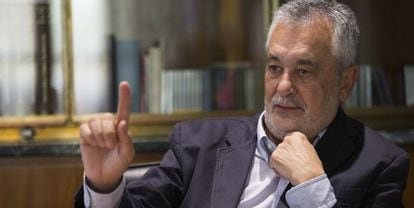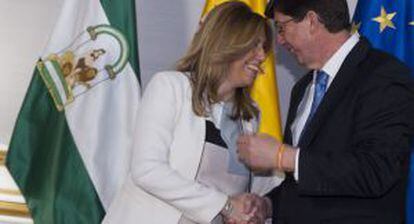Supreme Court probes ex-Andalusia chiefs for breach of public duty
Manuel Chaves gives up deputy’s seat following judge’s report in ERE layoff fund case


The Supreme Court judge in charge of the ERE case, an investigation into the misallocation of millions of euros in aid money to struggling businesses in Andalusia, feels that two former regional premiers may have engaged in a breach of public duty.
Manuel Chaves and José Antonio Griñán, both of the Socialist Party, are the targets of an ongoing court investigation into a fund scheme that handed out as much as €855 million between 2000 and 2010.
The ERE case – which takes its name from the Spanish acronym for a mass layoff plan – has been under investigation in the Seville courts for over a decade, but part of the probe was transferred to the Supreme Court in late 2014 because some of the people involved have immunity from the lower courts.
Judge Barreiro says the Andalusian government committed “genuine illegalities” in connection with the fund
Following news of Judge Alberto Jorge Barreiro’s decision to keep investigating him, Chaves on Thursday announced that he was giving up his seat in Congress. Griñán had already given up his senator’s seat on June 15.
Regional premier Susana Díaz, also a Socialist, had said in early April that they knew “perfectly well that I will ask them for their seats, and there’s no arguing with that,” in reference to Chaves, Griñán and two other ex-regional officials under investigation in the case, the deputies Gaspar Zarrías and José Antonio Viera, who also gave up their seats on Thursday.
A fifth politician under scrutiny, Senator Mar Moreno, was dropped from the investigation because of a lack of evidence against her.
Emerging party Ciudadanos had agreed to support Díaz’s bid to be invested as Andalusian premier on condition that all politicians involved in court investigations be stripped of their official positions. Díaz won the regional elections on March 22, but found no support for her instatement over the following three months, leading to legislative gridlock in the Andalusian assembly. She finally took office on June 11.
In his written statement, Judge Barreiro says the Andalusian government committed “genuine illegalities” in connection with a fund that was set up by the Socialist regional government in 2000 to help firms make severance payments to laid-off workers.
The examining magistrate feels that Griñán, who ruled the region between 2009 and 2013, should remain under investigation as an alleged “co-perpetrator” of the crimes in question. Chaves, who was regional premier between 1990-2009, also remains under scrutiny.

In a 130-page document, the judge analyzes a payout scheme that was in place for a decade, between 2000 and 2010, and notes how the legal subsidy plan was gradually changed into a finance transfer system that could bypass the kind of monitoring required for aid money.
The judge also examines 22 budget changes made throughout that period, which he describes as “arbitrary” because they were decided by members of the government executive. These changes fed substantial amounts of money into the fund for “illegally awarded” subsidies, he believes.
Barreiro also wonders to what extent Griñán, Chaves, Zarrías and Vieira were ignorant about what was going on, as they claimed in court testimony.










































